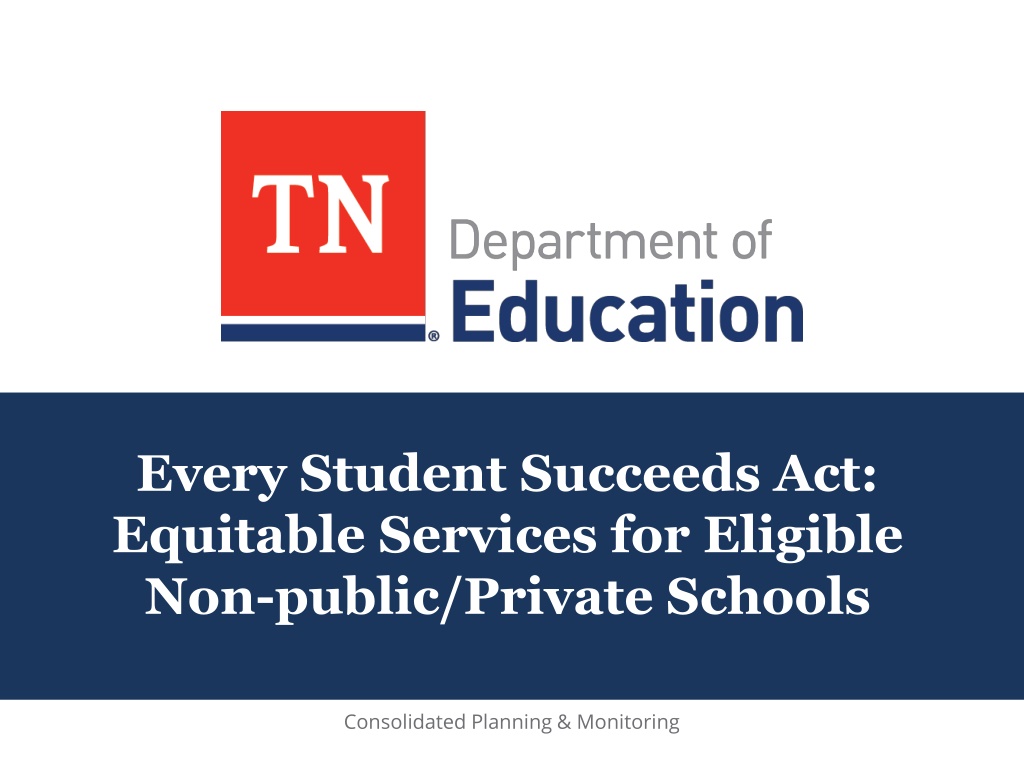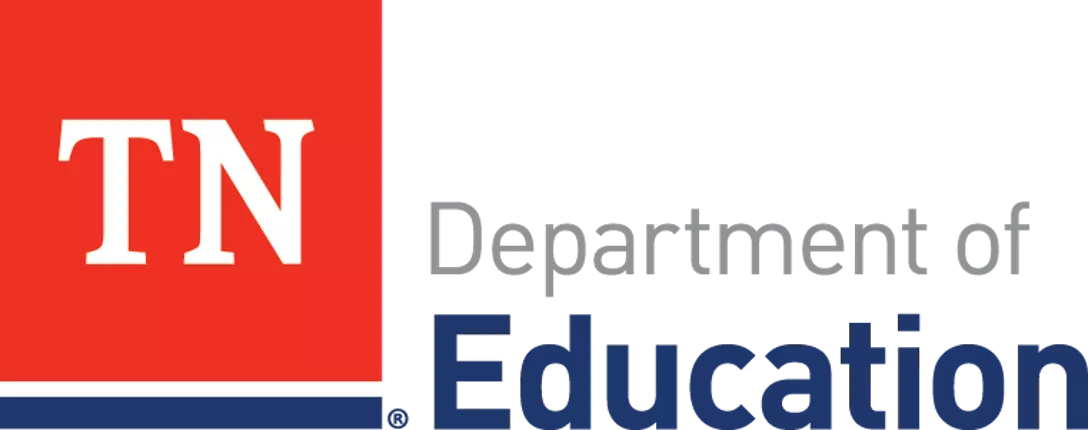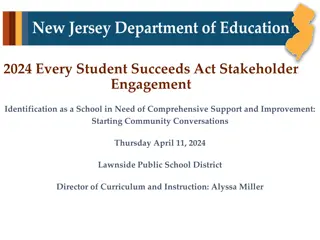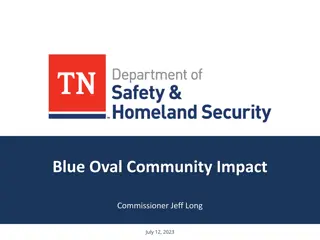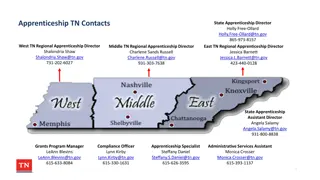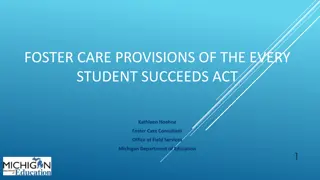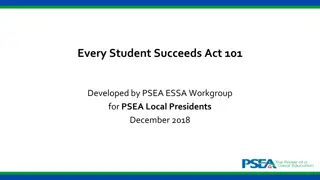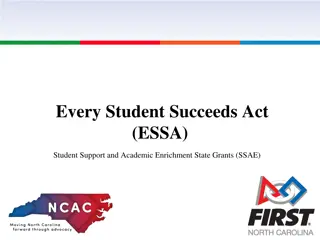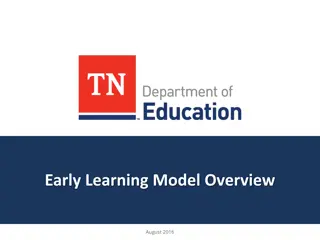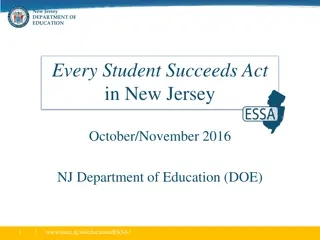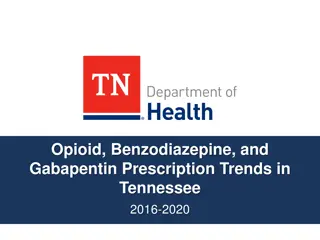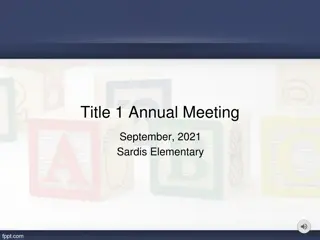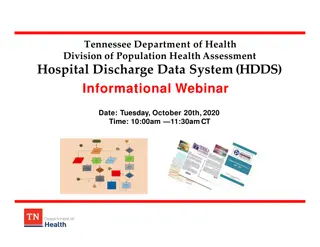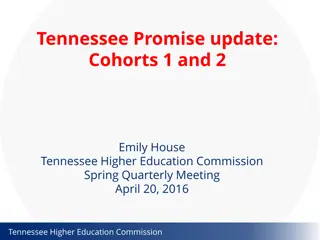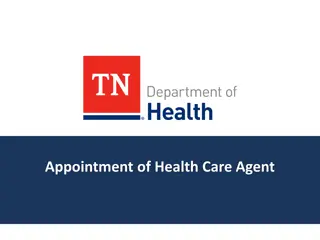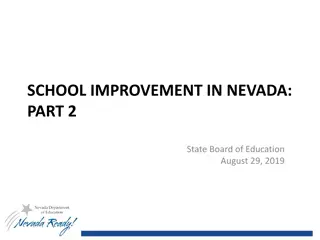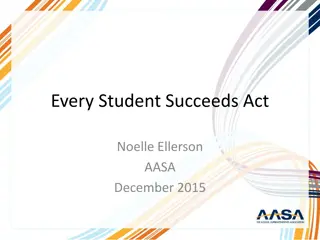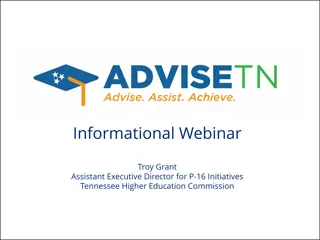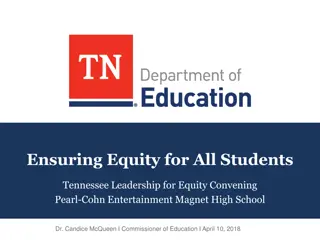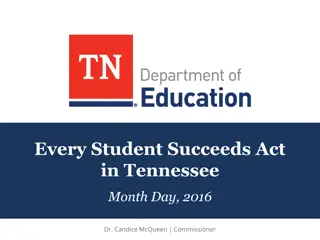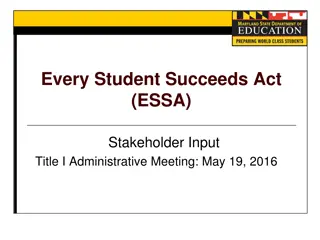Empowering Tennessee Schools: Every Student Succeeds Act Overview
Tennessee's implementation of the Every Student Succeeds Act (ESSA) is detailed in this comprehensive plan, outlining equitable services for eligible non-public/private schools. From objectives to aligned strategic plans, this initiative aims to enhance decision-making authority and flexibility in education programs. By aligning with Tennessee Succeeds, the state prioritizes excellence and equity in education, setting ambitious goals in five priority areas to ensure all students are equipped for success in life.
Download Presentation

Please find below an Image/Link to download the presentation.
The content on the website is provided AS IS for your information and personal use only. It may not be sold, licensed, or shared on other websites without obtaining consent from the author. Download presentation by click this link. If you encounter any issues during the download, it is possible that the publisher has removed the file from their server.
E N D
Presentation Transcript
Every Student Succeeds Act: Equitable Services for Eligible Non-public/Private Schools Consolidated Planning & Monitoring
Keith Woodruff Equitable Services & Charter Schools Coordinator Consolidated Planning & Monitoring Keith.Woodruff@tn.gov (615) 741-3385
Objectives Brief overview of the Tennessee ESSA state plan Overview of equitable services requirements under ESSA State services if school district does not meet requirements Ombudsman requirement Consultation requirements Changes to equitable share calculation CFA Changes Resources 4
ESSA State Plan Overview
Every Student Succeeds Act ESSA provides: more state-level decision-making authority, and new flexibilities for programs and spending. Tennessee is uniquely positioned to take full advantage of the opportunities. 6
ESSA State Plan Aligned with Strategic Plan Tennessee has made education a top priority. Fastest improving state Clear vision and long-term goals Comprehensive strategic plan: Tennessee Succeeds Tennessee s ESSA state plan is aligned with Tennessee Succeeds and the five priority areas. 7
Our Vision Districts and schools in Tennessee will exemplify excellence and equity such that all students are equipped with the knowledge and skills to successfully embark upon their chosen path in life. 8
Overview of Equitable Services Under ESSA
Overview of ESSA Changes ESSA includes separate provisions governing equitable services for eligible private school students, teachers and other educational personnel, and families. 13
Overview of ESSA Changes Many requirements are maintained from the No Child Left Behind Act (NCLB). ESSA includes many similar changes to the equitable services requirements under both Title I and Title VIII; others changes are different. Reference U.S. Department of Education (ED) non- regulatory guidance here. 14
Equitable Services Equitable services requirements for non-public/private schools apply to programs under 1117 or 8501: Title I, Part A (Improving Basic Programs) Title I, Part C (Migrant Education) Title II, Part A (Supporting Effective Instruction) Title III, Part A (English Language Acquisition) Title IV, Part A (Student Support & Academic Enrichment) Title IV, Part B (21st CCLC) 15
Equitable Services Educational services and other benefits provided under this section for private school children, teachers, and other educational personnel shall be equitable in comparison to services and other benefits for public school children, teachers, and other educational personnel participating in the program andshall be provided in a timely manner. 16
Allocating Funds for Equitable Services Expenditures for equitable services to eligible private school children, teachers and other educational personnel, and families must be equal to the proportion of funds allocated to participating public school attendance areas based on the number of children from low-income families who reside in those attendance areas and attend private schools. ESSA 1117(a)(4)(A) 17
Allocating Funds for Equitable Services A school district must determine the proportionate share of Title I funds available for equitable services based on the total amount of Title I funds received by the school district prior to any allowable expenditures or transfers of funds. ESSA 1117(a)(4)(A) 18
Notice of Allocation by the Department The Tennessee Department of Education (the department) must provide notice in a timely mannerof the allocation of funds for educational services and other benefits under each program that a school district has determined are available for eligible private school children, teachers and other educational personnel, and families. ESSA 1117(a)(4)(C) and 8501(a)(4)(C) 19
Obligation of Funds Funds allocated to a school district for educational services and other benefits to eligible private school children, teachers and other educational personnel, and families must be obligated in the fiscal year for which the funds are received by the school district. ESSA 1117(a)(4)(B) and 8501(a)(4)(B) Extenuating circumstances: funds not obligated are available for equitable services in the subsequent school year. 20
Obligation of Funds The department continues to be responsible for determining school district allocations and for ensuring the school districts provision of equitable services to private school students. 21
State Services: When the School District Does Not Meet Obligations
Compliance State Services The department must provide equitable services directly or through contracts with public or private agencies, organizations, or institutions, if appropriate private school officials have: 23
Compliance State Services requested that the department provide such services directly; and demonstrated that the school district has not met applicable equitable services requirements in accordance with the procedures for making such a request, as prescribed by the department. ESSA 1117(b)(6)(C) and 8501(c)(6)(C) 24
Right to File a Complaint Non-public schools may file a complaint if they believe that: timely and meaningful consultation did not occur; the district did not give due consideration to the views of the non-public school officials; or the funds generated or services to be provided are not equitable. 25
Right to File a Complaint A sample complaint form is available on ePlan under TDOE Resources and on the department s website. Private schools must send the complaint to the school district and the department. The school district must upload to ePlan all of their documents concerning the equitable services complaint. The timeframe for the department s response is 45 days. 26
School District Fiscal Repercussions However, the department believes that districts should be responsible for all of its students. In instances where the state must intervene to ensure that eligible students in participating non-public schools are receiving appropriate services, the state will incorporate fiscal repercussions for districts through its policies and procedures. 27
School District Fiscal Repercussions Penalty may include the state withholding a percentage of the district s Title I administrative dollars for these services. 28
Ombudsman Requirement
Ombudsman Requirement To help ensure equitable services and other benefits for eligible private school children, teachers and other educational personnel, and families, the department mustdesignate an ombudsman to monitor and enforce ESEA equitable services requirements under both Title I and Title VIII. ESSA 1117(a)(3)(B) and 8501(a)(3)(B) 30
Tennessee Ombudsman Position Tennessee has added the ombudsman position to the CPM staff for planning for the 2017-18 school year to provide support and assistance to districts in the transition to ESSA. 31
Tennessee Ombudsman Position Tennessee s designated ombudsman will serve as the primary point of contact for addressing questions and concerns from non-public/private school officials and school districts regarding the provision of equitable services under Titles I and VIII. 32
Tennessee Ombudsman Position The CPM equitable services and charter schools coordinator has been designated as the ombudsman responsible for ensuring that equitable services requirements are met by school districts. Keith.Woodruff@tn.gov (615) 741-3385 desk (615) 917-3465 mobile 33
Consultation Requirements
Consultation Requirement Goal of consultation: agreement between the school district and appropriate private school officials on how to provide equitable and effective programs for eligible private school children. The results of the agreement following consultation must be uploaded to ePlan by the school district by August 1. 35
Consultation Topics Expanded Topics subject to consultation for Title I have been expanded to include the following: how the proportion of funds allocated for equitable services is determined; whether the school district will provide services directly or through a separate school district or third-party contractor; when, including the approximate time of day, services will be provided; 36
Consultation Topics Expanded whether to provide equitable services to eligible private school children by pooling funds or on a school-by-school basis; and whether to coordinate and use funds available for Title I equitable services with funds available for equitable services under programs covered under 8501(b). Reference 1117(b)(1) for other consultation issues that shall be included in the process. 37
Consultation Topics Expanded Topics subject to consultation for Title VIII have been expanded to include the following: how the amount of funds available for equitable services is determined; whether the school district responsible for providing equitable services will provide those services directly, through a separate school district, or through a third-party contractor; and 38
Consultation Topics Expanded whether to provide equitable services to eligible private school participants: by creating a pool or pools of funds with all of the funds allocated under programs covered under 8501(b), or on a school-by-school basis based on the proportionate share of funds available to provide services in each school. Reference 8501(c) for other consultation issues that must be included in the process. 39
Disagreement Over Use of Contractors If the school district disagrees with the views of the private school officials on the provision of services through a contract, the school district must provide to the private school officials a written explanation of the reasons why the school district has chosen not to use a contractor. 40
Consultation Before the School District Makes Decisions The consultation shall occur before the school district makes any decision that affects the opportunities of eligible private school children, teachers, and other educational personnel to participate in programs and shall continue throughout the implementation and assessment of activities under this section. 41
Discussion of Service Delivery Mechanisms The consultation shall include a discussion of service delivery mechanisms that the school district could use to provide equitable services to eligible private school children, teachers, administrators, and other staff. 42
Written Affirmation Each school district shall maintain in its records, and provide to the department in their consolidated funding application (CFA), a written affirmation signed by officials of each participating private school that the meaningful consultation required by this section has occurred. 43
Written Affirmation The written affirmation shall provide the option for private school officials to indicate such officials belief that timely and meaningful consultation has not occurred or that the program design is not equitable with respect to eligible private school children. A sample affirmation is available in the related documents section of the CFA. 44
Written Affirmation If private school officials do not provide such affirmation within a reasonable period of time, the school district shall forward to the department the documentation that such consultation has, or attempts at such consultation have taken place. 45
Changes to Equitable Share Calculation
Changes in Equitable Share Calculation ESSA includes significant changes in the calculation of equitable share. Title I 1117(a)(4)(A)(ii) requires that the proportionate share of funds for equitable services be determined based on: the total amount of Title I funds received by a district prior to any allowable expenditure or transfers by the district. 47
Changes in Equitable Share Calculation For all programs, 1117(a)(4)(B) and 8501(a)(4)(B) require that funds allocated to districts for educational services and other benefits to eligible non-public school children be obligated in the fiscal year for which the funds are received by the district. 48
Changes in Equitable Share Calculation Additionally, 1117(a)(4)(C) and 8501(a)(4)(C), require states to provide timely notice to appropriate non-public school officials in the state of the allocation of funds for equitable services that districts have determined are available for eligible non-public school children. 49
Support & Technical Assistance CPM regional consultants will: provide support and technical assistance during late fall and during the funding application review process, and ensure that the proportionate share is calculated correctly. The equitable share calculation will also be checked during monitoring visits including on-site visits to at least one non-public school in an school district being monitored. 50
